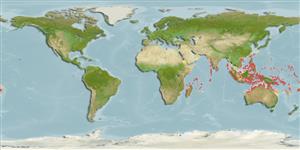Common names from other countries
>
Blenniiformes (Blennies) >
Blenniidae (Combtooth blennies) > Salariinae
Etymology: Cirripectes: Latin, cirrus = curl fringe + Greek, pektos, -e, -on = made of several parts solidly united (Ref. 45335); perustus: From possibly the bright red and yellow color of the male holotype and paratype..
More on author: Smith.
Environment: milieu / climate zone / depth range / distribution range
Ekologi
laut berasosiasi dengan karang; kisaran kedalaman 0 - 25 m (Ref. 529). Tropical; 30°N - 30°S
Indo-Pacific: Kenya to Taiwan and Kiribati; Palau, Yap, and Ifaluk in Micronesia. Likely to occur in Seychelles (Ref. 1623).
Length at first maturity / Size / Weight / umur
Maturity: Lm ?, range 5 - ? cm
Max length : 8.2 cm SL jantan/; (Ref. 529)
Duri punggung (Keseluruhan (total)): 11 - 12; duri punggung lunak (Keseluruhan (total)): 14-15; Duri dubur 2; Sirip dubur lunak: 14 - 16; vertebrata, bertulang belakang: 30 - 31. Diagnosis: Dorsal fin XII, 14, membrane attached to caudal fin, entire, first spine more or less the same height as second; anal fin II, 15; pectoral rays 15; pelvic fin I, 3; caudal fin procurrent rays 10-12. Vertebrae 10 + 20. LL, without scales and scalelike flaps; LL tubes 0-3, canal ends below dorsal ray 5-11. Lower lip smooth mesially, plicate laterally. Upper lip crenulae 36-48. Gill rakers 23-28. Cephalic sensory pore system simple. Midsnout pores present. Cirri, supraorbital 6-23, nasal 5-25; nuchal cirri 30 to 46, divided into 3-4 groups, 3-group resulting from fusion of bases of dorsalmost groups at apex of nape, 4-group condition has dorsalmost groups meeting or overlapping. Body depth at anal-fin origin 3.2-3.5 in SL. Pectoral with 5 ventralmost rays red-tipped; iris with yellow-colored oval, oriented almost vertically, centered around pupil, rest of iris silvery white. Female head and body grey to yellowish brown with spots red becoming dark brown posteriorly; with pale diagonal stripe from upper lip to nape, across orbit; pectoral fins brown. Male unspotted, bicolored yellow anteriorly and reddish brown posteriorly; pectoral fins yellow (Ref. 529, 90102, 37816).
Facultative air-breathing (Ref. 126274); Adults inhabit shallow seaward reefs, from the intertidal zone to 25 m depth (Ref. 9710, 529). Oviparous. Eggs are demersal and adhesive (Ref. 205), and are attached to the substrate via a filamentous, adhesive pad or pedestal (Ref. 94114). Larvae are planktonic, often found in shallow, coastal waters (Ref. 94114).
Oviparous, distinct pairing (Ref. 205). Urogenital orifice of male genital papilla located basally between 2 widely separated slender filaments on a fleshy swelling behind anus; testes bulbous with length equal to its width (Ref. 529).
Williams, J.T., 1988. Revision and phylogenetic relationships of the blenniid fish genus Cirripectes. Indo-Pac. Fish. (17):78 p. (Ref. 529)
Status IUCN Red List (Ref. 130435)
CITES (Ref. 128078)
Not Evaluated
ancaman kepada manusia
Harmless
penggunaan manusia
Perikanan: tidak ada kepentingan
informasi lanjut
AcuanBudidaya airprofil budidaya airStrainGenetikaElectrophoresesDiturunkanPenyakit-penyakitPengolahanMass conversion
mitraGambarStamps, Coins Misc.Suara-suaraCiguateraKecepatanTipe renangArea insangOtolithsOtakPenglihatan / visi
Alat, peralatan
laporan khas
muat turun XML
Sumber internet
Estimates based on models
Preferred temperature (Ref.
115969): 26.3 - 29.3, mean 28.6 (based on 2456 cells).
Phylogenetic diversity index (Ref.
82804): PD
50 = 0.5000 [Uniqueness, from 0.5 = low to 2.0 = high].
Bayesian length-weight: a=0.01072 (0.00480 - 0.02393), b=3.01 (2.82 - 3.20), in cm Total Length, based on LWR estimates for this (Sub)family-body shape (Ref.
93245).
Trophic level (Ref.
69278): 2.0 ±0.00 se; based on food items.
Daya lenting (Ref.
120179): Tinggi, Waktu penggandaan populasi minimum kurang dari 15 bulan (Preliminary K or Fecundity.).
Fishing Vulnerability (Ref.
59153): Low vulnerability (10 of 100).
